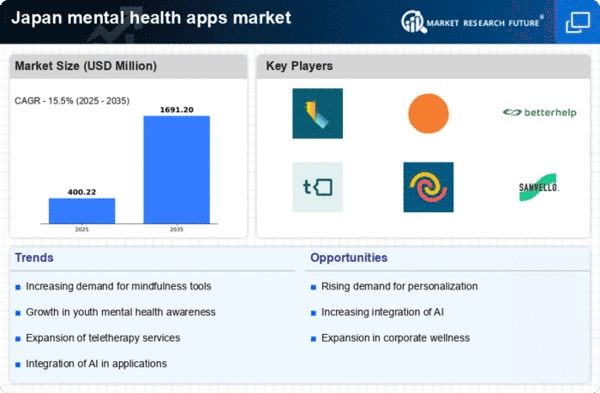Rising Mental Health Awareness
The increasing awareness surrounding mental health issues in Japan is a pivotal driver for the mental health-apps market. As societal stigma diminishes, more individuals are seeking help for mental health concerns. Recent surveys indicate that approximately 30% of the population acknowledges experiencing mental health challenges, leading to a surge in demand for accessible solutions. This heightened awareness encourages the development of innovative applications tailored to various mental health needs, thereby expanding the market. Furthermore, educational campaigns by non-profit organizations and healthcare providers are instrumental in promoting mental health literacy, which in turn fosters a more supportive environment for app adoption. The mental health-apps market is likely to benefit from this cultural shift, as users increasingly turn to technology for support and resources.
Focus on Preventive Mental Health Care
The emphasis on preventive mental health care is becoming increasingly prominent in Japan, driving growth in the mental health-apps market. As healthcare systems shift towards preventive measures, there is a growing recognition of the importance of early intervention in mental health issues. Apps that promote mindfulness, stress management, and emotional well-being are gaining traction among users. Research indicates that preventive mental health care can reduce the incidence of severe mental health disorders by up to 25%. Consequently, the mental health-apps market is witnessing a surge in applications designed to help users proactively manage their mental health, fostering a culture of wellness and resilience.
Technological Advancements in App Development
Technological advancements play a crucial role in shaping the mental health-apps market. The integration of artificial intelligence (AI) and machine learning algorithms enhances user experience by providing personalized recommendations and real-time feedback. For instance, AI-driven chatbots can offer immediate support, making mental health resources more accessible. Additionally, the rise of wearable technology allows for the monitoring of mental health indicators, such as stress levels and sleep patterns, which can be integrated into apps. This convergence of technology not only improves user engagement but also increases the efficacy of mental health interventions. As developers continue to innovate, the mental health-apps market is poised for substantial growth, with projections suggesting a compound annual growth rate (CAGR) of over 20% in the coming years.
Increased Investment in Mental Health Solutions
Investment in mental health solutions is a significant driver for the mental health-apps market. Venture capital funding for mental health startups in Japan has seen a notable increase, with investments reaching approximately $200 million in the last year alone. This influx of capital enables developers to create more sophisticated applications that address a wide range of mental health issues. Furthermore, partnerships between tech companies and healthcare providers are becoming more common, facilitating the development of comprehensive mental health solutions. As financial backing continues to grow, the mental health-apps market is likely to expand, offering users a diverse array of tools and resources to manage their mental well-being effectively.
Growing Demand for Remote Mental Health Services
The demand for remote mental health services is rapidly increasing in Japan, significantly impacting the mental health-apps market. With a population that values convenience and accessibility, many individuals prefer using apps for therapy and support rather than traditional in-person consultations. Recent studies indicate that over 40% of users express a preference for digital solutions, citing ease of use and anonymity as key factors. This trend is further supported by the rise of telehealth services, which have made mental health care more accessible to those in remote areas. As the appetite for remote services continues to grow, the mental health-apps market is likely to see a corresponding increase in user adoption and engagement.

















Leave a Comment